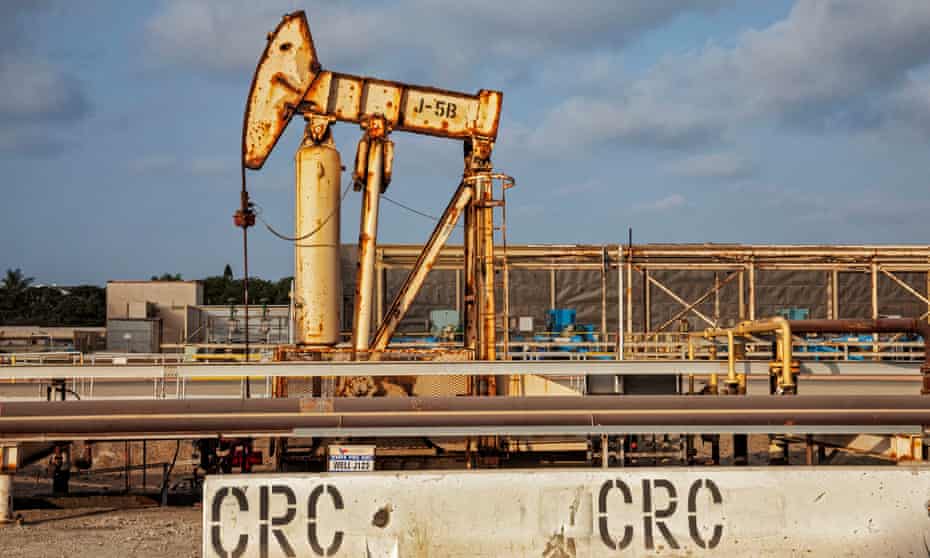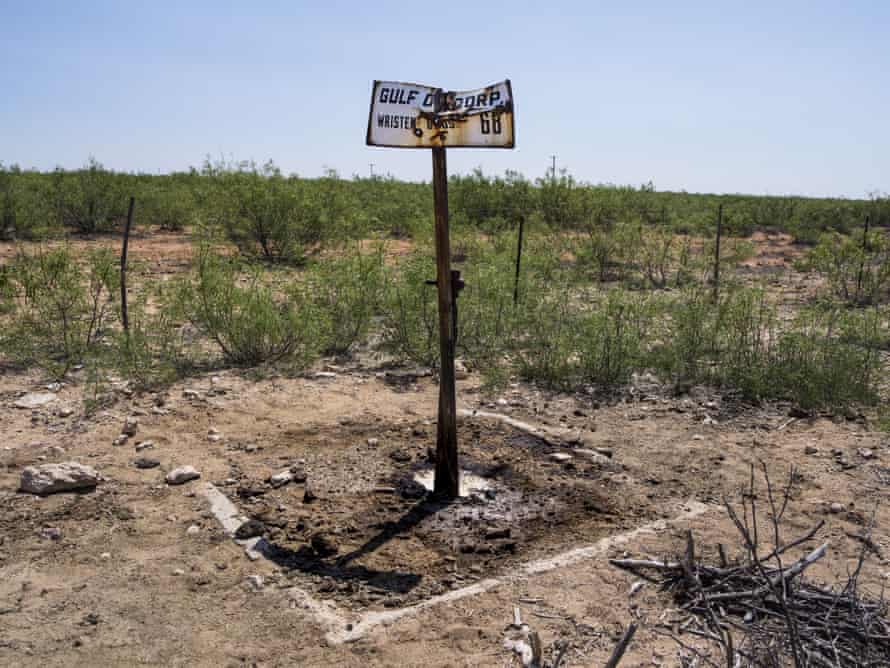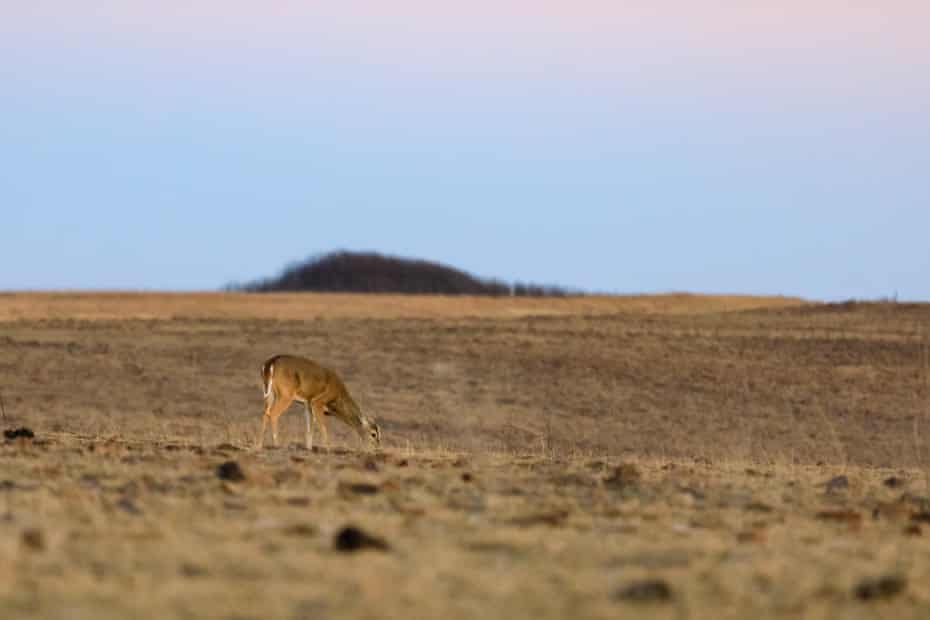Will taxpayers bear the cost of cleaning up America’s abandoned oil wells?

Policy experts warn new proposals to plug abandoned oil and gas wells amount to huge subsidy for the fossil fuel industry
Last modified on Tue 21 Sep 2021 13.30 EDT
Oil and gas companies have a century-old bad habit of drilling wells and ditching them. And while Congress finally has a plan to plug some abandoned wells, new proposals effectively pass the fossil fuel industry’s cleanup costs on to taxpayers and may even enable more drilling.
Concerned parties seem to agree on the scale of the crisis: millions of wells sit untended across the US, leaking toxins that pose public health problems along with the potent greenhouse gas methane, which contributes to the climate emergency.
But powerful special interests have carved out a presence in federal well-plugging efforts – one of the most bipartisan corners of Joe Biden’s $1tn infrastructure bill, which is due for a vote later this month. Instead of requiring fossil fuel companies to cover the actual cost of drilling and cleanup, policy experts say the proposal is an additional multibillion-dollar subsidy for the industry most responsible for driving the climate crisis.
“People on the surface think that this is a good environmental thing … but the devil is in the details,” said Megan Milliken Biven, a consultant and former program analyst with the Bureau of Ocean Energy Management. “This is a bill for the bosses.”

Congress’ 30-page proposal does provide a much-needed plan to inventory, measure and track methane emissions and groundwater contamination associated with orphan wells – abandoned wells with no identifiable owner.
But tucked inside the proposal is $2m in funding that goes directly to the Interstate Oil and Gas Compact Commission (IOGCC), an organization closely linked to the fossil fuel industry. The draft bill empowers the group to consult with the federal government as it issues billions of dollars in grants for states to plug, remediate and restore orphan wells.
The infrastructure bill treats the commission innocuously, granting it duties and access to federal research and development funds as if it were a formal government entity.
The trouble is, it’s not.
And as recent comments from the IOGCC vice-chair, Wayne Christian, suggest, the organization’s involvement in the infrastructure negotiation process includes more explicit pocket-padding priorities.
“If the bill passes, and we’re pretty close to it passing, 25 million [dollars] will be coming to Texas to clean up abandoned wells, and larger amounts than that in the future,” Christian – an avid climate change denier and head of the Railroad Commission of Texas with notoriously close ties to the oil industry – boasted on 20 August at the North American Prospect Expo, an oil industry gathering, according to a recording of the event.
“So, we will be helping the energy industry to some of these trillions of dollars,” he said.
On its website, the IOGCC calls itself a “multi-state government agency”. But it also claims exemption from public information laws. Although the group has said it does not lobby, according to ProPublica, it has spent an estimated $100,000 on Capitol Hill since March 2019 lobbying for favorable well-plugging programs – which may explain the group’s inclusion in the bill.
The IOGCC was originally sanctioned by the government. But as an InsideClimate investigation found, in 1978 the Department of Justice recommended that Congress break it up on the grounds that the group had evolved into an advocacy organization. Its influence, through a membership network it wines and dines, has reached its tentacles into state legislatures across the country, with copy-and-pasted legislation advancing oil and gas interests.
Oklahoma’s Governor Kevin Stitt currently chairs the group. Stitt, who received more than $240,000 in campaign donations from the oil and gas sector in 2018, is known for urging the Environmental Protection Agency to strip Indigenous tribes of regulatory authority over their land, and for co-signing a letter urging the Biden administration to resume oil and gas leasing on public lands.

Jesse Coleman, senior researcher at the watchdog group Documented, has been investigating the IOGCC for years. He said he was surprised to see a pseudo-agency identified as an arbiter of the orphan well program, calling it an even “more powerful, more direct role” than the group usually gets, which he said was problematic because no government entity oversees the IOGCC.
“Any real amount of power going to this organization, which is funded by the oil and gas industry, [strips] power away from actual government agencies that do have oversight and accountability,” Coleman said.
A representative for the Democratic New Mexico senator Ben Ray Lujan, who co-sponsored the legislation, explained that according to the proposal, the IOGCC’s role is to provide technical assistance and consultation.
“Consultation is distinct from control,” Lujan’s office said, defending the necessity of the IOGCC’s position in orphan well cleanup.
Two lawmakers involved in drafting earlier, distinct orphan well proposals, the Colorado senator Michael Bennet and New Mexico representative Teresa Leger Fernandez, did not respond to the Guardian’s inquiries about the IOGCC’s role in the infrastructure bill, noting instead over email a commitment to pursuing bonding reform on federal land through the budget reconciliation process.
Advocates point out these measures won’t stop drilling and well abandonment on state and private land, where most drilling takes place.
Upset landowners and advocates say lax regulations have long let companies get away with covering just a fraction of the actual cost of plugging wells. In Colorado, for instance, state regulators require producers to post a $10,000 to $20,000 bond to cover the future expense of sealing off a well they drill, when the true cost is closer to $140,000 a pop, according to the thinktank Carbon Tracker. In other states, such as Texas, total costs top $100bn.
Oil and gas giants are increasingly selling less productive wells to smaller companies that buy them up and scrape them dry. But when those smaller companies later go bankrupt – which has happened increasingly during the pandemic – the fossil fuel entities that drilled the original wells essentially cash out and cumulatively dodge hundreds of billions in cleanup costs.
The scheme ultimately lands those cleanup costs – an estimated $280bn – on taxpayers, including, most egregiously, residents suffering from the impacts of pumping and scraping oil and gas from the ground. Proximity to a well is linked with increased risk of preterm birth and elevated childhood cancer rates.
The leading environmental organizations the National Wildlife Federation and Environmental Defense Fund have endorsed the current bill. John Goldstein, senior director of regulatory and legislative affairs for the EDF, said the group was not worried about IOGCC influence. “We didn’t want to see this opportunity pass us by to get this funding out the door,” he said.
Rob Schuwerk, executive director of Carbon Tracker’s North America office, said a federal program like what’s in the infrastructure bill was necessary to plug wells no one was taking responsibility for.
“The question is, does it then incentivize people to hold off plugging wells because they think federal money is going to be there for it?” he said. Plus, plugging orphan wells won’t eliminate methane emissions across the oil and gas sector at anywhere near the scale needed to avert the worst effects of the climate emergency, scientists have pointed out, as long as drilling continues.
“I think [lawmakers] really need to be scrutinizing that issue and ensuring that they address the incentives and moral hazard problem, not just money to plug wells,” Schuwerk said. “There should be a good quid pro quo.”
This story is published as part of Covering Climate Now, a global collaboration of news outlets strengthening coverage of the climate story
.png)